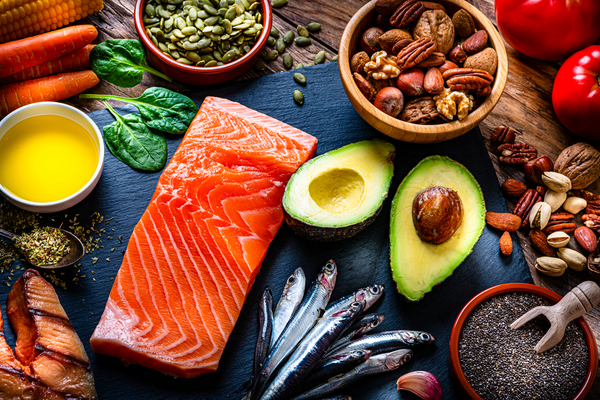This comprehensive panel measures the levels of six key vitamins and four essential minerals to help you discover possible gaps in your nutrition. You can measure your results over time and make data-driven decisions to optimize your nutrition and health.
What’s Tested:
Vitamins
Folate (Vitamin B9)
Helps your body make new red blood cells and DNA, and it plays an important role in a fetus’s development.
Symptoms of deficiency: Fatigue and weight loss.
Sources: Leafy greens, beans, seafood, eggs and more.
Vitamin A (retinol)
Essential for maintaining healthy vision, supporting cell growth, metabolism, immune function, and proper functioning of the heart, lungs, bones, and other organs.
Symptoms of deficiency: Fatigue, vision problems, dry/scaly and/or itchy skin, and potentially increased risk of infections.
Sources: Carrots, sweet potatoes, leafy green vegetables, and dairy products.
Vitamin B12
Plays an essential role in red blood cell formation, cell metabolism, nerve function and more.
Symptoms of deficiency: Fatigue, weight loss and loss of appetite.
Sources: Nutritional yeast, plant-based milks and certain cereals.
Vitamin C (ascorbic acid)
Vital for immune support, collagen production, wound healing, and antioxidant protection. Vitamin C also improves the absorption of iron your body.
Symptoms of deficiency: Fatigue, bruising, joint pain, or slow-healing wounds.
Sources: Fruit and vegetables such as citrus, strawberries, bell peppers, and broccoli.
Vitamin D (25-hydroxy)
Helps your body regulate calcium metabolism which in turn helps maintain healthy bones, controls infections, reduces inflammation and more.
Symptoms of deficiency: Fatigue, muscle weakness and depression. Additionally, you could become more prone to having fractures from falls.
Sources: Your skin produces vitamin D through sunlight exposure, and it’s found in foods such as fatty fish, mushrooms, egg yolks and fortified milks.
Vitamin E (alpha-tocopherol and gamma-tocopherol)
Helps protect cells, support immune function, promote wound healing, reduce inflammation, and may prevent blood clots.
Symptoms of deficiency: Fatigue, weakened immunity, balance problems, or vision issues.
Sources: Fruits, nuts, seeds, plant oils, eggs, and leafy greens.
Minerals
Iodine
Supports your thyroid function by helping to produce thyroid hormones.
Symptoms of deficiency: Fatigue, weight gain, dry skin, confusion and more.
Sources: Iodized salt, milk, yogurt, cheese, shrimp, cod and tuna.
Ferritin
Ferritin is a protein that stores iron for future use when the body needs it most. Iron carries oxygen throughout the body in red blood cells.
Symptoms of deficiency: If your iron level is low, you may become anemic and may feel tired, dizzy, or short of breath. High iron levels may led to liver disease, heart problems and diabetes.
Sources: Legumes, protein (beef, poultry, eggs) and vegetables (dark, leafy greens)1
Magnesium
Helps your muscles, nerves and heart work properly. Magnesium can impact the balance of other electrolytes, including potassium.
Symptoms of deficiency: Fatigue, muscle cramps, numbness and/or tingling, an irregular heartbeat and more.
Sources: Legumes, nuts, seeds, greens and whole grains.
Zinc
Helps support your immune system and metabolism.
Symptoms of deficiency: Weight loss, loss of appetite, decreased immunity and hair loss.
Sources: Red meat, chicken, oysters, beans, lentils, nuts and chickpeas.
The descriptions, symptoms and sources listed above are not intended to be a complete list, and are provided for reference only. We recommend you consult with a healthcare provider if you have any questions about your results.








